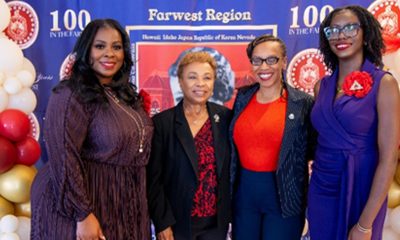Activism
Women of the Black Panther Party Speak
On Feb. 10, the Berkeley Talks released the 161st episode of the podcast series, which featured women who were members of the Black Panther Party. In it, Judy Juanita, Madalynn Rucker and Ericka Huggins discuss their time with the Black Panther Party at a UC Berkeley event held in October 2022, in celebration of the new book “Comrade Sisters: Women of the Black Panther Party.”

UC Berkeley Public Affairs
On Feb. 10, the Berkeley Talks released the 161st episode of the podcast series, which featured women who were members of the Black Panther Party.
In it, Judy Juanita, Madalynn Rucker and Ericka Huggins discuss their time with the Black Panther Party at a UC Berkeley event held in October 2022, in celebration of the new book “Comrade Sisters: Women of the Black Panther Party.”
“I knew that my big purpose was to learn how to love because I was raised in a community that was not loved,” says Ericka Huggins, who co-authored “Comrade Sisters” with photographer Stephen Shames.
Huggins, who was director of the Oakland Community School led by the Black Panther Party, continues:
“The school, by the way, was tuition-free, child-centered, three meals a day, parent-friendly, how about that? And we had a connection with Children’s Hospital. And we loved every child personally.
“We knew their full names, their parents’ names, their aunties’ and grandmothers’ names, if they were the ones caring for them. And we knew what they liked. And a hug was not a shameful thing. Tears were not shameful, whether they came from girls or boys. So, the way we loved the children was the way we had wanted to be loved.
“I could see the impact on the future generation’s understanding that I came from a generation that didn’t have what we were offering. And it worked.”
Shames, who became the most trusted photographer of the Black Panthers who wasn’t a member, took behind-the-scenes photos — some of which are in “Comrade Sisters” — that other photographers couldn’t get close enough to capture.
“One of the things that really impressed me were the women of the Black Panther Party,” says Shames. “They were really the soul, the heart of the party. Almost two-thirds of the members of the party were women. Women ran most of the programs in some of the chapters. The Panthers were really one of the most progressive organizations at the time, in terms of the role of women in their party.”
This conversation, which took place on Oct. 20, 2022, was hosted by the National Association of Black Journalists at UC Berkeley and The Reva and David Logan Gallery of Documentary Photography at Berkeley Journalism.
It was co-sponsored by Berkeley’s Department of History, the Department of African American Studies, the Department of American Studies, The Othering & Belonging Institute, the American Cultures Center, the Department of Gender and Women’s Studies, the Department of Ethnic Studies, the Fotovision endowment and ACC Art Books.
Listen to the full conversation in Berkeley Talks episode 161: “Women of the Black Panther Party” at https://www.youtube.com/watch?v=H2Lckr8cTq4
Activism
OP-ED: AB 1349 Puts Corporate Power Over Community
Since Ticketmaster and Live Nation merged in 2010, ticket prices have jumped more than 150 percent. Activities that once fit a family’s budget now take significant disposable income that most working families simply don’t have. The problem is compounded by a system that has tilted access toward the wealthy and white-collar workers. If you have a fancy credit card, you get “presale access,” and if you work in an office instead of a warehouse, you might be able to wait in an online queue to buy a ticket. Access now means privilege.

By Bishop Joseph Simmons, Senior Pastor, Greater St. Paul Baptist Church, Oakland
As a pastor, I believe in the power that a sense of community can have on improving people’s lives. Live events are one of the few places where people from different backgrounds and ages can share the same space and experience – where construction workers sit next to lawyers at a concert, and teenagers enjoy a basketball game with their grandparents. Yet, over the past decade, I’ve witnessed these experiences – the concerts, games, and cultural events where we gather – become increasingly unaffordable, and it is a shame.
These moments of connection matter as they form part of the fabric that holds communities together. But that fabric is fraying because of Ticketmaster/Live Nation’s unchecked control over access to live events. Unfortunately, AB 1349 would only further entrench their corporate power over our spaces.
Since Ticketmaster and Live Nation merged in 2010, ticket prices have jumped more than 150 percent. Activities that once fit a family’s budget now take significant disposable income that most working families simply don’t have. The problem is compounded by a system that has tilted access toward the wealthy and white-collar workers. If you have a fancy credit card, you get “presale access,” and if you work in an office instead of a warehouse, you might be able to wait in an online queue to buy a ticket. Access now means privilege.
Power over live events is concentrated in a single corporate entity, and this regime operates without transparency or accountability – much like a dictator. Ticketmaster controls 80 percent of first-sale tickets and nearly a third of resale tickets, but they still want more. More power, more control for Ticketmaster means higher prices and less access for consumers. It’s the agenda they are pushing nationally, with the help of former Trump political operatives, who are quietly trying to undo the antitrust lawsuit launched against Ticketmaster/Live Nation under President Biden’s DOJ.
That’s why I’m deeply concerned about AB 1349 in its current form. Rather than reining in Ticketmaster’s power, the bill risks strengthening it, aligning with Trump. AB 1349 gives Ticketmaster the ability to control a consumer’s ticket forever by granting Ticketmaster’s regime new powers in state law to prevent consumers from reselling or giving away their tickets. It also creates new pathways for Ticketmaster to discriminate and retaliate against consumers who choose to shop around for the best service and fees on resale platforms that aren’t yet controlled by Ticketmaster. These provisions are anti-consumer and anti-democratic.
California has an opportunity to stand with consumers, to demand transparency, and to restore genuine competition in this industry. But that requires legislation developed with input from the community and faith leaders, not proposals backed by the very company causing the harm.
Will our laws reflect fairness, inclusion, and accountability? Or will we let corporate interests tighten their grip on spaces that should belong to everyone? I, for one, support the former and encourage the California Legislature to reject AB 1349 outright or amend it to remove any provisions that expand Ticketmaster’s control. I also urge community members to contact their representatives and advocate for accessible, inclusive live events for all Californians. Let’s work together to ensure these gathering spaces remain open and welcoming to everyone, regardless of income or background.
Activism
Oakland Post: Week of December 31, 2025 – January 6, 2026
The printed Weekly Edition of the Oakland Post: Week of – December 31, 2025 – January 6, 2026

To enlarge your view of this issue, use the slider, magnifying glass icon or full page icon in the lower right corner of the browser window.
Activism
Big God Ministry Gives Away Toys in Marin City
Pastor Hall also gave a message of encouragement to the crowd, thanking Jesus for the “best year of their lives.” He asked each of the children what they wanted to be when they grow up.

By Godfrey Lee
Big God Ministries, pastored by David Hall, gave toys to the children in Marin City on Monday, Dec. 15, on the lawn near the corner of Drake Avenue and Donahue Street.
Pastor Hall also gave a message of encouragement to the crowd, thanking Jesus for the “best year of their lives.” He asked each of the children what they wanted to be when they grew up.
Around 75 parents and children were there to receive the presents, which consisted mainly of Gideon Bibles, Cat in the Hat pillows, Barbie dolls, Tonka trucks, and Lego building sets.
A half dozen volunteers from the Big God Ministry, including Donnie Roary, helped to set up the tables for the toy giveaway. The worship music was sung by Ruby Friedman, Keri Carpenter, and Jake Monaghan, who also played the accordion.
Big God Ministries meets on Sundays at 10 a.m. at the Mill Valley Community Center, 180 Camino Alto, Mill Valley, CA Their phone number is (415) 797-2567.
-

 Activism4 weeks ago
Activism4 weeks agoDesmond Gumbs — Visionary Founder, Mentor, and Builder of Opportunity
-

 Activism4 weeks ago
Activism4 weeks agoFamilies Across the U.S. Are Facing an ‘Affordability Crisis,’ Says United Way Bay Area
-

 Alameda County4 weeks ago
Alameda County4 weeks agoOakland Council Expands Citywide Security Cameras Despite Major Opposition
-

 Alameda County4 weeks ago
Alameda County4 weeks agoBling It On: Holiday Lights Brighten Dark Nights All Around the Bay
-

 Activism4 weeks ago
Activism4 weeks agoBlack Arts Movement Business District Named New Cultural District in California
-

 Activism4 weeks ago
Activism4 weeks agoLu Lu’s House is Not Just Toying Around with the Community
-

 Activism4 weeks ago
Activism4 weeks agoOakland Post: Week of December 17 – 23, 2025
-

 Black History3 weeks ago
Black History3 weeks agoAlfred Cralle: Inventor of the Ice Cream Scoop






















































